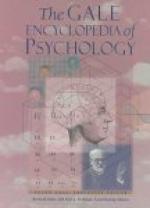|
This section contains 659 words (approx. 3 pages at 300 words per page) |

|
An intelligence test in which performance is not based on experience with or knowledge of a specific culture.
Culture-fair tests, also called culture-free tests, are designed to assess intelligence (or other attributes) without relying on knowledge specific to any individual cultural group. The first culture-fair test, called Army Examination Beta, was developed by the United States military during World War II to screen soldiers of average intelligence who were illiterate or for whom English was a second language. Beginning in the postwar period, culture-fair tests, which rely largely on nonverbal questions, have been used in public schools with Hispanic students and other non-native-English speakers whose lack of familiarity with both English language and American culture have made it impossible to assess their intelligence level using standard IQ tests. Culture-fair tests currently administered include the Learning Potential Assessment Device (DPAD), the Culture-Free Self-Esteem Inventories, and the Cattell...
|
This section contains 659 words (approx. 3 pages at 300 words per page) |

|


